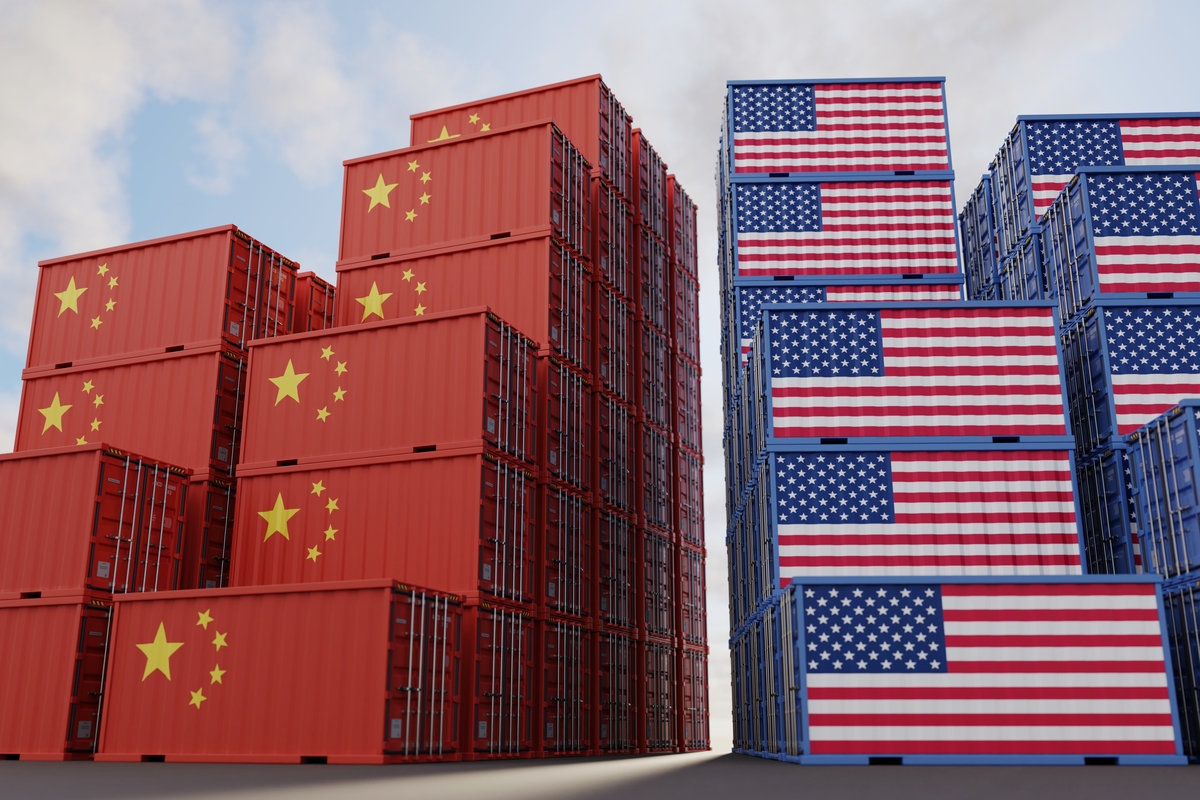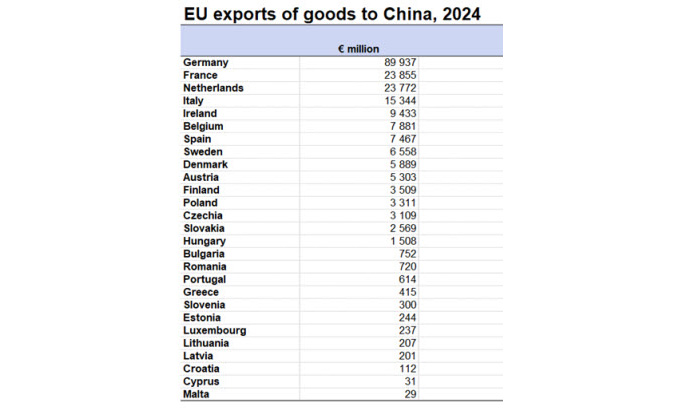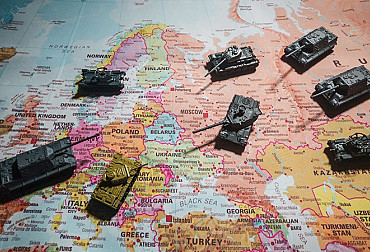The US-China trade war is forcing the world to pick sides
Beijing warns other countries not to participate in the isolation of Chinese goods and companies in trade agreements with the US. The Middle Kingdom intends to introduce retaliatory measures against anyone who negotiates with the United States "at the expense of Chinese interests." Some countries have therefore found themselves in a difficult position, having to choose between the world's two largest economies. Their governments are rushing to conclude a customs agreement with Washington while facing pressure from Beijing to purchase goods that the Chinese cannot sell to US customers.

China has become the focus of attention of the US government after President Donald Trump suspended a wave of unilateral "reciprocal" measures against most countries for 90 days. He left in place tariffs of 145% on Chinese goods (with the exception of smartphones, computer monitors and various electronic components). Higher tariffs (25%) on cars, spare parts, and certain commodities (aluminum and steel) also remain in place. Beijing has taken retaliatory measures and imposed its own tariffs of 125% on US goods. Trump has repeatedly called on the Middle Kingdom to start negotiations to avert a trade war. However, China has rejected the president's call, claiming that the US has not made its demands clear.
Official Chinese statements reject capitulation to US economic pressure and call on the international community not to "sit idly by in the face of the hegemonic and bullying behavior of the United States." In July, a 90-day transition period will end, after which tariffs for many countries will increase sharply. This development can be prevented if the US agrees to prevent the transport of Chinese goods through its territory, prevent Chinese companies from localizing production (in order to circumvent US tariffs), and prevent the import of cheap Chinese industrial goods. Through bilateral negotiations with more than 70 countries, the White House wants to force Beijing to return to the negotiating table and abandon its "defiant stance."
Beijing has reportedly stated that it will "never accept" any country entering into agreements with Washington at its expense and will "definitely introduce reciprocal countermeasures." The Chinese have already begun demanding restrictions on exports of certain products to the US, such as South Korean electronics and electronic components containing rare earths of Chinese origin. In addition, President Xi Jinping visited Cambodia, Malaysia, and Vietnam in mid-April, where he sought to strengthen mutual economic cooperation. During his trip, he presented the Middle Kingdom as a "responsible power willing to cooperate with neighboring countries to mitigate the impact of US tariffs." Chinese leaders have also stepped up contacts with US allies, including EU member states and Japan.

"China has realized that strategic decoupling may be the ultimate goal of the US and that talks are just a delaying tactic," said Zhao Minghao of the Center for US Studies at Fudan University in Shanghai. "China hopes that third countries such as Vietnam will be able to withstand the pressure from the Trump administration."
The US-China trade war therefore puts the rest of the world in a difficult position. The rivalry between the two economic giants once represented an advantage for countries seeking foreign aid and investment. However, Washington is now wielding the "whip" instead of "sugar," and Beijing seems ready to follow suit. Southeast Asian countries in particular, such as Cambodia and Vietnam, cannot afford to give up US exports, but they also cannot afford to lose Chinese investment. Cautious maneuvering may result in symbolic gestures to appease Washington, but ultimately Beijing will not stray from its economic course. Their most likely course of action will be to try to accommodate the United States on some trade demands while offering China deeper security cooperation as compensation.
The US pressure tactics are part of a broader strategy promoted by Treasury Secretary Scott Bessent to isolate the Chinese economy, which has recently gained momentum among Trump's officials. According to Bessent, Australia, India, Japan, South Korea, and the United Kingdom are likely to join the US side soon. Another step by the White House could be to delist Chinese stocks from US stock exchanges.
China's future response can only be guessed at, but the example of Lithuania suggests how far Beijing is willing to go in the case of smaller European countries. The history of Lithuanian-Chinese tensions began in 2013, when Vilnius hosted the Dalai Lama and expressed solidarity with Tibet. However, mutual trade continued to grow and relations between the two countries remained warm, at least until 2019. At that time, Lithuanian officials decided to reject a Chinese proposal to invest in the deep-water port of Klaipėda (unlike similar investments in Belgium, Italy, Germany, and Greece) due to national security concerns. "We cannot allow China to control the port of Klaipėda," said then-Defense Minister Raimundas Karoblis. Beijing could "create obstacles to the arrival of military cargo, military equipment, and reinforcements" in times of crisis, such as in the event of a war with Russia.
However, the turning point came later, in July 2021, when Lithuania approved the opening of a Taiwanese Representative Office in Vilnius instead of a Taipei Representative Office. China interprets the use of the word "Taiwan" as questioning its claims to the island, which is why almost all European countries (including the Czech Republic) have Taipei representative offices. In response, Beijing recalled its ambassador and worsened diplomatic relations with Lithuania. At the same time, it deployed economic pressure tactics and imposed an unofficial trade embargo on Vilnius. China removed Lithuania from its customs list, thereby postponing imports or refusing Lithuanian products (even European products if they contained Lithuanian components). "Chinese customs statistics show that trade from Lithuania to China fell by 80% between January and October 2022 compared to the previous year," Tomas Janeliunas, professor of international relations at Vilnius University, told Politico magazine. The European Union quickly expressed its support for Lithuania and launched a dispute with the World Trade Organization against the Middle Kingdom's coercive practices.
The US-China trade war is forcing third countries to choose between the two economic superpowers. Close US allies such as Australia, Japan, and the United Kingdom are very likely to align their foreign trade rules with Washington. The dynamically developing India will probably join them, and perhaps South Korea, which, however, faces Chinese economic pressure to remain at least neutral. In extreme cases, Beijing may respond to anti-Chinese policies by imposing an unofficial trade embargo, as Lithuania tried a few years ago. The current Czech government will almost certainly remain critical of Beijing at the political level until the end of its term in office this fall. However, it will not hinder the growth of mutual trade, nor will it attempt to jeopardize it with any strong foreign policy gestures (such as renaming the Taipei Representative Office in Prague to the Taiwanese Representative Office). Nevertheless, the new Czech government will have to respond to the new geopolitical reality and lean more strongly, both economically and politically, either towards the United States led by Donald Trump or towards communist China.



















